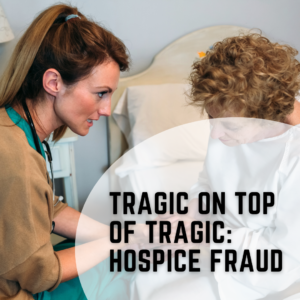 A tragedy on top of an existing tragedy is sweeping across America: hospice fraud. Imagine having to place a loved one in a hospice only to learn that your loved one was abused and neglected.
A tragedy on top of an existing tragedy is sweeping across America: hospice fraud. Imagine having to place a loved one in a hospice only to learn that your loved one was abused and neglected.
As with any other fraud, hospice fraud is about opportunity and the need to make money off the most vulnerable of the vulnerable. Medicare numbers show that in 2021, $21 billion was paid out, as the number of hospices has grown to about 5,000.
Within that number of end-of-life facilities it has been found that kickbacks and abuse has flourished.
Detail of a travesty
Earlier this year, writers Kim Christensen and Ben Poston writing for the L.A. Times, detailed one such case that is illustrative of what is happening. Four, L.A. area individuals (two couples) bilked Medicare out of $4.2 million in hospice reimbursements. The couples ran a scheme to pay doctors to improperly diagnose patients and/or give out kickbacks for patient referrals.
In California alone, “16 people face multiple felony counts including conspiracy to commit insurance fraud, insurance fraud and grand theft, and some also face charges related to identity theft, money laundering and tax evasion.”
“End-of-life care is a difficult process for families to endure, and patients should be able to trust that their hospice providers are acting in good faith,” said Atty. Gen. Rob Bonta. “The crimes allegedly committed by the defendants against their patients, Medicare and our state’s Medi-Cal program will not be tolerated.”
The amount of hospice fraud became so great that on January 1, 2022 a moratorium was placed on granting California hospice licenses. In the fraud referred to above, two married couples were charged. Together, they owned New Hope Hospice Inc. and Sterling Hospice Care Inc. in San Bernardino County, California. One of the couples has been arrested, while the other is at large.
The four defendants began their mis-diagnosis and kickback fraud in 2015 and scammed the government until 2021. In all, 30 patients were “placed in hospice,” though some were not aware of it, nor were many of them even sick. The couples could face up to 27 years in jail.
“Sign up to die”
Obviously to become eligible for palliative hospice care, declared terminally ill by their doctors and then by a hospice physician. Once in hospice, the centers can bill Medicare. The two couples found a way around it. The patients who were not sick literally signed a contract with promises of future medical care, equipment or housekeeping services signed away their rights to lifesaving emergency medical treatment.
With the licensing moratorium in place states like California can run audits and determine the impact of fraudulent operations on the Medicare and Medi-Cal programs. It obviously, should have never gotten to this point.
Without ethical expectations it is no wonder millions in scams were allowed to fester. The question I am asked as a healthcare ethics speaker and healthcare ethics consultant is how billions in fake hospice funds were paid out and further how they could rationalize such behavior?
In the lapse of oversight, fraud easily creeps in between the cracks. Medicare is the healthcare “cookie jar,” and providers and owners sometimes take as much as they can. They rationalize their behavior under the banner of “no-one cares.” The combination of lapsed oversite and those using the opportunity to steal is often an overwhelming temptation.
Ethics training could help stop it, but Medicare must be committed enough to institute programs. Ultimately, two very human problems emerge:
Those scammed may end up with a diagnosis that could be treated but they lose the benefits to do so, and those legitimately admitted to hospice could wind up getting no palliative care at all.
LEAVE YOUR COMMENTS!


